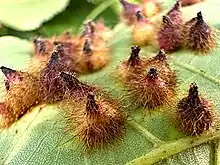| Caryomyia echinata | |
|---|---|
 | |
| Leaf galls, underside | |
 | |
| Leaf galls, upperside | |
| Scientific classification | |
| Domain: | Eukaryota |
| Kingdom: | Animalia |
| Phylum: | Arthropoda |
| Class: | Insecta |
| Order: | Diptera |
| Family: | Cecidomyiidae |
| Genus: | Caryomyia |
| Species: | C. echinata |
| Binomial name | |
| Caryomyia echinata Gagne, 2008 | |
Caryomyia echinata, the hickory spiny gall midge, is a species[1] of gall midge in the family Cecidomyiidae, occurring in Eastern North America. [2]
Etymology
"The name echinata is a Latin adjective meaning spiny, with reference to the long, stiff hairs covering the gall." [3]: 38
Ecology
Larvae induce galls on the leaves of hickory trees, including Carya laciniosa, Carya ovata, Carya pallida, Carya texana, and Carya tomentosa. [4] Pupae emerge in late summer through the side of the gall near the base.[3]: 50
"This gall is the only woody Caryomyia gall that is covered with very long, stiff hairs and occurs between instead of on veins." [3]: 38
References
- ↑ "Caryomyia echinata". iNaturalist. Retrieved 2023-08-26.
- ↑ "Caryomyia echinata". Animal Diversity Web. University of Michigan.
- 1 2 3 Gagné, R. J.; Solis, M. A. (2008). "The gall midges (Diptera: Cecidomyiidae) of hickories (Juglandaceae: Carya)". Memoirs of the American Entomological Society. Biodiversity Heritage Library. 48.
- ↑ "Caryomyia echinata". Gallformers.
This article is issued from Wikipedia. The text is licensed under Creative Commons - Attribution - Sharealike. Additional terms may apply for the media files.